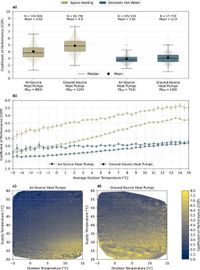As global energy consumption continues to rise, attention has turned to heat pumps as a sustainable alternative for heating residential buildings. A recent large-scale study spanning two years and analyzing sensor data from 1,023 heat pumps across Central Europe has unveiled critical insights into operational efficiency, revealing that a notable proportion struggle to meet currently established standards.
Heat pumps play a crucial role in reducing reliance on fossil fuels, which is essential for combating climate change. They siphon heat from natural sources like ground, air, or water, making them an energy-efficient option for home heating. However, the prevalence of heat pump technology does not directly correlate with optimal performance, as many systems actually exhibit significant operational challenges.
This extensive investigation, identified as the largest of its kind to date, has found that approximately 17% of air-source heat pumps and 2% of ground-source pumps fail to meet efficiency standards set for European systems. Furthermore, the study indicates that about 10% of installed systems are oversized, while around 1% are undersized, suggesting a need for greater attention to post-installation evaluations and adjustments.
Conducted by researchers monitoring real-world performance, this study makes clear the urgency of improving the installation and operational protocols linked to heat pumps. A significant finding from the research was that the performance of these systems can significantly deviate from expected benchmarks, leading to increased energy consumption and costs that are detrimental to both users and the broader heating transition goals.
According to the authors of the study, "The success of the heating transition is therefore closely tied to the performance of heat pumps in the field. Maximizing energy efficiency... is relevant for electricity grids, as these systems significantly increase both total and peak power demand." This awareness comes in light of the International Energy Agency's (IEA) predictions that the global installed capacity of heat pumps must dramatically increase to mitigate emissions targets.
The core of the analysis relied on assessing sensor data and operational characteristics to understand heat pump performance effectively. With the support of modern digital tools, the study enhances the potential for utility companies and users to monitor energy efficiency, thereby helping to bridge existing gaps in performance evaluations.
The operational data were sourced from a range of installations in various countries, including Germany, the Netherlands, and Austria, to ensure the study’s findings are applicable on a broader scale across Central Europe. By establishing metrics based on real operational data rather than relying on laboratory conditions, the researchers are advocating for a paradigm shift in how heat pump efficiency is evaluated.
Key metrics derived from the research include the coefficient of performance (COP), a critical measure that describes the efficiency of heat pumps. The findings concluded that COP values reveal substantial variability between systems, with some achieving up to three times the efficiency of their counterparts, underscoring the importance of targeted diagnostics for low-performing units.
The researchers emphasize that standardized post-installation evaluation protocols need to be established. The study asserts that addressing the immediate need for proper monitoring could significantly enhance user satisfaction, leading to increased acceptance of heat pump technology in residential homes.
Moreover, management practices that educate end-users about maintaining optimal efficiency levels in their systems are essential. The authors stipulate, "Digital monitoring... should be implemented to offer users feedback on their systems, leading to a better understanding of operational energy consumption, and thereby contributing to overall satisfaction with heat pump technology." This engagement between users and technology could prove vital in optimizing energy usage while enhancing long-term performance.
Overall, this comprehensive field study serves as a wake-up call regarding the effective use of heat pumps and highlights the crucial steps necessary for enhancing operational efficiency in real-world applications. By addressing the issues of misconfiguration, user education, and inadequate installation practices, the study opens pathways for better scalability of heat pump technology as a viable tool in the fight against climate change.

